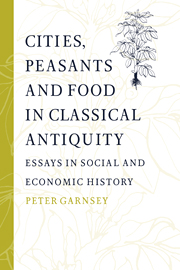Book contents
- Frontmatter
- Contents
- Preface
- Editor's preface
- Acknowledgements
- List of abbreviations
- PART I CITIES
- 1 Aspects of the decline of the urban aristocracy in the empire
- 2 Independent freedmen and the economy of Roman Italy under the Principate
- 3 Economy and society of Mediolanum under the Principate
- 4 Urban property investment in Roman society
- 5 An association of builders in late antique Sardis
- PART II PEASANTS
- PART III FOOD
- Bibliography
- Index
5 - An association of builders in late antique Sardis
Published online by Cambridge University Press: 02 December 2009
- Frontmatter
- Contents
- Preface
- Editor's preface
- Acknowledgements
- List of abbreviations
- PART I CITIES
- 1 Aspects of the decline of the urban aristocracy in the empire
- 2 Independent freedmen and the economy of Roman Italy under the Principate
- 3 Economy and society of Mediolanum under the Principate
- 4 Urban property investment in Roman society
- 5 An association of builders in late antique Sardis
- PART II PEASANTS
- PART III FOOD
- Bibliography
- Index
Summary
THE DOCUMENT
This is an agreement made in ad 459 between an association of builders in Sardis and an official, called in the document magistrianos kai ekdikos. If, as is likely, this man is the equivalent of the defensor civitatis known from the early fourth century, then he was the top city official, who may also be regarded as a minor imperial functionary.
According to the preamble (lines 9ff.), certain private employers, ergodotes, have filed complaints with the defensor to the effect that men who contract to do building jobs leave them unfinished and obstruct their employers in some way unspecified.
The association concedes that these practices are injurious to employers and agrees that they will be stopped, provided that employers are ready to pay for jobs (lines 20ff.).
The document then spells out procedures to be followed in certain circumstances:
First (lines 23ff.), if a job is abandoned by someone, a substitute will be furnished from within the association – provided that the man being replaced is himself a member of the association. Second (lines 31ff.), in the event of obstruction by the original craftsman or a substitute, misthoi (presumably ‘compensation’, though ‘pay’ is a more natural translation) will be furnished (‘by us’ is restored). Third (lines 39ff.), the employer, it appears, is expected to give twenty days grace to a craftsman who stops working because of illness (in other cases seven days grace is considered appropriate, lines 37ff.).
- Type
- Chapter
- Information
- Cities, Peasants and Food in Classical AntiquityEssays in Social and Economic History, pp. 77 - 88Publisher: Cambridge University PressPrint publication year: 1998



